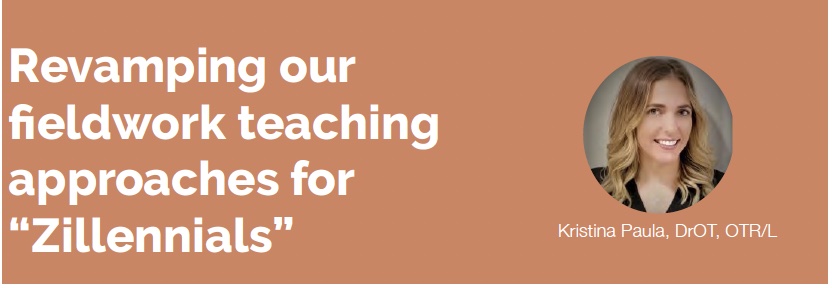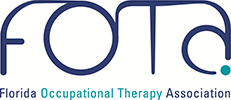Revamping our fieldwork teaching approaches for "zillennials"

Have you ever spoken to fieldwork students and felt like it went in one ear and out the other? Well maybe because it has. Let’s take a step back and consider it from the student’s learning perspective; it is not due to their unwillingness to learn. Most universities have adopted an adult learning style to meet the learning needs of students from younger generations, however, fieldwork educators may continue to use the same teaching strategies from previous generations. As these students’ learning styles have evolved, we cannot continue to propose the same teaching styles we used 15, 10, or even 5 years ago. As occupational therapists, we adapt our therapeutic use of self to meet the individual needs of our clients. Fieldwork educators must also adjust our therapeutic use of self to enhance our interactions with fieldwork students for their learning experience.
Most of our fieldwork students are considered Zillennials. These students are wedged at the tail end of the Millennials and the start of Gen Z (those born between the years 1994-2000). Zillennials are considered digital natives, multitaskers, and overly confident; however, they also prefer to work alone, lack initiation and professional boundaries, and occasionally fall short in areas of creativity and self-awareness. This can be a challenge for fieldwork educators and students. As each new generation enters fieldwork, fieldwork educators are challenged to revamp their teaching style. So, how can fieldwork educators support Zillennials?
1. Mentorship versus Supervision: Zillennials dislike environments with rules and restrictions; rather they prefer to seek a learning culture with an emphasis on guidance and mentorship (Bartz et al., 2017). A supervision approach aims to oversee that a student performs a task appropriately, and is both remediation-centered and authoritative. While a mentorship approach is centered around a relationship formed between an experienced (fieldwork educator) and less experienced (student); the relationship is strength-based and built on a partnership founded on listening, trust, and loyalty. Fieldwork educators can facilitate a mentorship culture through daily check-ins that are designed to promote meaningful discussions and prompt self-reflections (Fehring & Rodrigues, 2017). Check-ins are designed t o encourage the discovery of ideas and prompt self-reflection, such as:
- How did you feel while conducting the evaluation independently this week?
- What areas would you like further support or opportunities for practice in?
- What is something you could have changed during your treatment/evaluation session?
- How are you progressing through your weekly site objectives?
- What are some barriers you are experiencing and what strategies are you utilizing to accomplish the objectives
- What can we do next time to modify the intervention to make it more challenging for the patient?
- The benefit of the one-to-one relationship between student and fieldwork educator allows for flexibility in teaching approaches. As fieldwork educators move closer to emphasizing mentorship over task completion, this will create a positive teaching and learning environment for both educators and students. As we begin to feel confident in meeting the Zillennial learning style, we will have to adjust our teaching models to meet the upcoming generation Alpha!
References
Bartz, D., Thompson, K., & Rice, P. (2017). Maximize the human capital of millennials through supervisors using performance management. International Journal of Management, Business and Administration, 20(1), 1–9.
DeIuliis, E. (2017). Professionalism across occupational therapy clinical practice. SLACK Incorporated.
Fehring, H., & Rodrigues, S. (Eds). (2017). Teaching, coaching, and mentoring adult learners: Lessons for professionalism. Routledge.
Mattila, A. M. (2019). Practice-ready skills for the capstone. In E. D. DeIuliis & J. A. Bednarski (Eds.), The entry level occupational therapy doctorate capstone: A framework for the experience and project (pp. 79–91). SLACK Incorporated.
Reflectdigital. (2023). [Untitled image of generational time frame]. Zillennials: The Widely Unrecognised Microgeneration. https://www. reflectdigital.co.uk/blog/zillennials-
